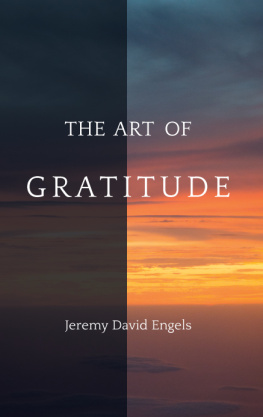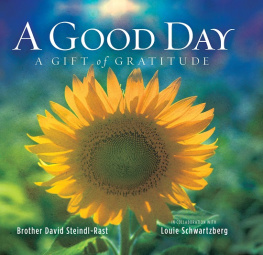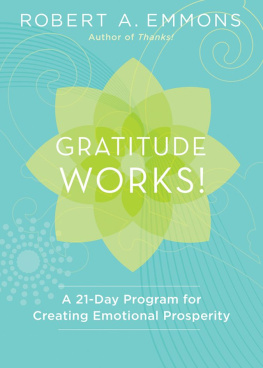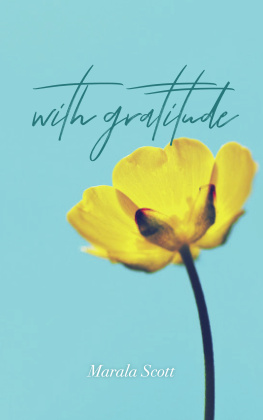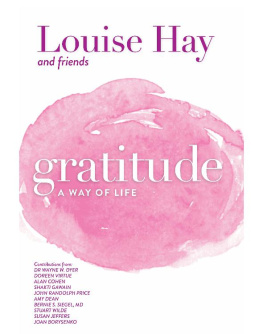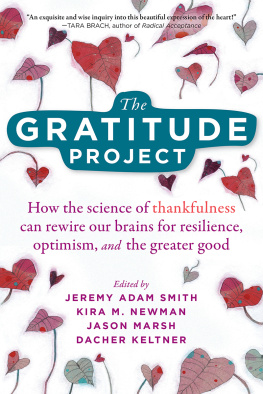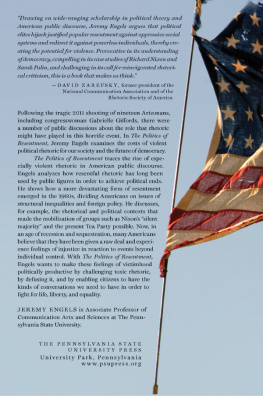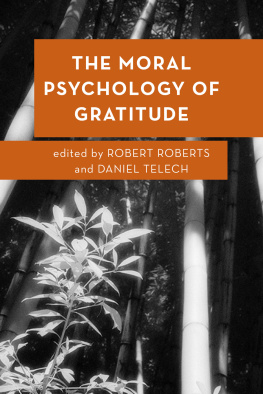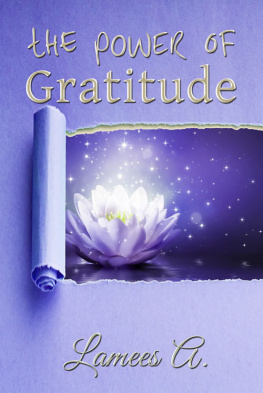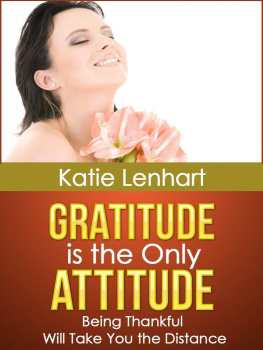The Art of Gratitude
The Art of Gratitude
Jeremy David Engels
Cover image courtesy of Anna Sunderland Engels.
Published by State University of New York Press, Albany
2018 State University of New York
All rights reserved
Printed in the United States of America
No part of this book may be used or reproduced in any manner whatsoever without written permission. No part of this book may be stored in a retrieval system or transmitted in any form or by any means including electronic, electrostatic, magnetic tape, mechanical, photocopying, recording, or otherwise without the prior permission in writing of the publisher.
For information, contact State University of New York Press, Albany, NY
www.sunypress.edu
Library of Congress Cataloging-in-Publication Data
Names: Engels, Jeremy David, 1979 author.
Title: The art of gratitude / Jeremy David Engels.
Description: Albany, NY : State University of New York, 2018. | Includes bibliographical references and index.
Identifiers: LCCN 2017023407 (print) | LCCN 2018011350 (ebook) | ISBN 9781438469348 (ebook) | ISBN 9781438469331 (hardcover : alk. paper)
Subjects: LCSH: Gratitude.
Classification: LCC BJ1533.G8 (ebook) | LCC BJ1533.G8 E54 2018 (print) | DDC 179/.9dc23
LC record available at https://lccn.loc.gov/2017023407
10 9 8 7 6 5 4 3 2 1
To my mentors, who inspired me to lead the examined life:
Andrew & Kay Davis, and Greg Shepherd.
Contents
Introduction
Gratitude s Keywords
Chapter 1
Words Matter: On the Rhetoric of Emotion
Chapter 2
From Charis to Gratia: On the Political Origins of the Debt of Gratitude
Chapter 3
Gratitudo: On Christian Gratitude and Existential Debt
Chapter 4
Indebted: On the Contemporary Gratitude Literature
Chapter 5
Santosha: On the Yoga of Gratitude
Conclusion
The Politics of a Sunset: From Gratefulness to the Common Good
Acknowledgments
In his strange, weird, perplexing essay Gifts, published in 1844, Ralph Waldo Emerson describes the paradox at the heart of gratitudethe paradox that I pursue and ponder in this bookwith his typical wit. He observes that though Americans are taught to be grateful, when it comes down to it people hate receiving gifts. It is not the office of a man to receive gifts. How dare you give them? We wish to be self-sustained. We do not quite forgive a giver. The one who bears gifts is not, for Emerson, a benefactor; he is a malefactor, a bearer of evil, because the expectation of gratitude is mean. Emerson here reiterates the commonplace argument (which goes back to ancient Greece) that there is no such thing as a free gift. A gift given demands a return gift, which makes gratitude a synonym for indebtedness. I bet that all of us have, at one time or another, received a gift that was really a burden in disguise, a debt wrapped up in pretty paper with a nice little bow. Does this mean, however, that we should reject all gifts and gratitude, too? Certainly not. We wish to be self-reliant, self-sustained; we wish to go it alone, but in the end we cannot. All of us live, Emerson concludes, in a condition of universal dependence. We are empowered by our social world, by the earth on which we stand, by nature, by the common good, by those around us. We must be grateful for such support. The paradox, then, is that a virtuous human life demands gratitude. And yet we secretly recoil from gratitude, because we fear that to acknowledge a gift is to assume a debt.
That is the paradox. The challenge is to change how we experience gratitude, moving away from the debt of gratitude to gratitude as thankfulness, or what I call in this book gratefulness. It is possible to give thanks without affirming debt, and it is possible to build a society, and a democracy, that is based on shared gratefulness rather than rituals of indebtedness. The Art of Gratitude , as I describe in this book, challenges each of us to recognize the many forms of supportmental, emotional, spiritual, physical, social, political, material, ecological, economicthat make it possible for us to live. We do not live in isolation. We did not build this alone. We stand on the shoulders of giantsand on the earth, which we share in common.
I think my academic field is similar to many others in that we celebrate the lonely, tortured genius, who, working through the night, fueled by caffeine, comes up with a new and revolutionary idea all by him- or herself. This ideal has long haunted the humanities. Though we write with keyboards rather than fountain pens, and by electric rather than candle light, like our Renaissance and Enlightenment forebearers contemporary scholars celebrate the heroic creator-inventor-genius. I am proud of this book. I am under no illusions, however, that I did it by myself. I did not write this book alone. Though the words (and the errors and missteps!) are mine, this book is made possible by the fantastic research and institutional support I received while writing it. The book would not exist in the absence of the many friends and colleagues who read and commented on parts of the manuscript. And without my friends and family, I would have no words to write. To everyone, and everything, that made this book possible, I extend my deepest, most profound thanksgiving. Though one of my colleagues told me that writing about gratitude was like chasing windmills, The Art of Gratitude is the first thing I have written that genuinely represents the type of work I would like to do. To paraphrase Emerson, if you cut these pages they would bleed, especially given everything that happened while I was finishing this book. It can be a struggle to find your voice in academia, given the demand to publish or perish and the need to write in a highly specialized argot for an audience of professional critics trained in the art of destruction, not creation. As I wrote this book, I began to find my voice, in large measure because I talked with, and listened to, others.
Thanks to my dearest love Anna, who is my everything, for everything. When I meditate on courage, I always call your face to mind, for you are a walking, talking example of true courage, the type of courage required to do what is right even when it is difficult and unexpected. I am blessed to spend my days by your side. Thanks to my family, and to Annas family, for their kindness, generosity, warmth, and smiles. It was Anna who first introduced me to the physical practice of yoga over a decade agoand wow, who knows where I would be today without it! I shudder to thinkand this ultimately proved a philosophical homecoming of sorts for me. I wrote an essay on nonviolence in high school that drew on yoga philosophy and that won a medal at National History Day under the guidance and direction of Andrew Davis, my all-time favorite teacher and my greatest inspiration. Every time that I enter the classroom, I think to myself, if I can only be half as good a teacher as Andrew, I will have done my job today! To Andrew and Kay Davis of Wichita, Kansas, you are my academic family, and I love you. Thanks to everyone who has supported me on my yoga journey. A special thanks to Lara Heimann, who came into my life at a real low point, my back broken, my spirits low, and who taught me a sustainable, smart asana practice for life. And a hearty gratitude to the yoga teachers in State College who joined together to form Yoga Lab: Anna Sunderland Engels, Ariel Xu, Mark Agrusti, and Kristen Boccumini Thwing. I am proud and humbled to teach yoga alongside you and to run a studio with you. It has been fun to do something together to make our little town a better place.

